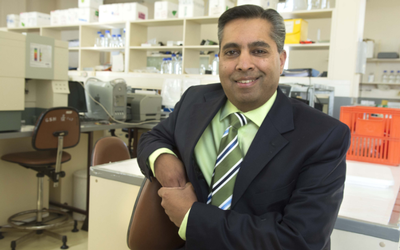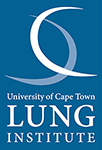
Prof Keertan Dheda
Keertan Dheda, is Professor of Respiratory Medicine, Director of the Centre for Lung Infection and Immunity (CLII), Head of the Division of Pulmonology in the Department of Medicine at the University of Cape Town (UCT) with a joint appointment at the London School of Hygiene and Tropical Medicine (LSHTM) as a Professor of Mycobacteriology and Global Health. He is a global research leader in the in the field of TB diagnosis and transmission. His global health-related work based at UCT and the LSHTM is performed across several countries including the UK, USA, France, Brazil, Zimbabwe, Mozambique, Zambia, South Africa, Malawi and Namibia.
He has published over 320 peer-reviewed papers (Scopus H index= 67; citations=17958 as at the 15 August 2021), 16 of which are citation classics (original publications with Dheda as first or senior author). He has been the recipient of several prestigious awards, the most recent being the EU Horizon 20/20 EDCTP Scientific Leadership award and the 2019 South African MRC Scientific Achievement Award (Platinum Medal). He serves on several national and international academic and advisory bodies, and several prestigious journal editorial boards including the American Journal of Respiratory and Critical Medicine, and Lancet Respiratory Diseases, amongst others (these are ranked 1st and 2nd in fields of TB and respiratory medicine). He is an inventor or co-inventor on 6 patents related to new TB control technologies. He has founded one spin-off company and is the founder and director of a charity called Free of TB, which seeks to promote the well-being of patients with TB.
He currently holds or has held several advisory positions at international level (WHO, NIH, Global Alliance etc). He has served on grant reviewer panels and committees for several organisations including the Welcome Trust, EU, UK MRC, NIH Canadian Institutes of Health Research, Gates Grand Challenges, and the South African MRC, amongst others. His scientific achievements and biography were profiled in The Lancet and in the Business Day (leading commercial newspaper in South Africa). He is also an active hospital-based clinician and has an interest in airways diseases and interventional pulmonology. He is frequently quoted and consulted by national and international news agencies and the media.
His teaching activities have included the supervision of Masters and PhD students, and post doctoral scientists (several of whom are now leading their own groups), and he has contributed to several undergraduate and postgraduate courses including the teaching and training of medical students and health professionals. He has acted as a convenor of several courses and academic conferences, chaired many global conference sessions, and has delivered plenary or keynote lectures at several international meetings including those of the British Thoracic Society, the American Thoracic Society, and the International Union Against Tuberculosis and Lung Disease, amongst others. He has contributed to the teaching and training of health professionals in Africa and has previously contributed to teaching activities of the Fellowship of Postgraduate Medicine, MRCP teaching courses, and the British Medical Journal learning resource modules.
From a global health perspective, he has contributed to the development of clinical trial sites and infrastructure in several African countries, and has been involved in several capacity building related global health programmes including those involving UCL, New York University (NYU), AIIMS and SVIMS (India), McGill (Canada), several African countries (Zimbabwe, Zambia, Tanzania, Mozambique, Botswana and Malawi) and several European countries (UK, Germany, Italy, Netherlands). Most recently, a new collaborative initiative has been set up between the LSHTM and UCT through a Newton Fund award. The vision is to establish a hub to train African scientists in genomic technologies with a specific aim of facilitating diagnostic readouts for tailored TB therapy in Europe and Africa.
Dheda has extensive experience in managing complex multi-centre translational projects and clinical trials related to TB diagnosis and transmission. Exemplars include: (i) the EDCTP-funded multi-country TB-NEAT study (Lancet 2014 & Lancet 2016) which assessed the feasibility, utility and impact on patient outcomes of DNA and urine-based TB diagnostics when placed at the point of care (both studies unpinned WHO recommendations); (ii) the EU-funded XACT I study (Lancet Inf Dis 2017) and (iii) the NIH-funded XACT II study (recently completed and precursor to the ongoing XACT III and XACT-19 projects funded through the EDCTP, UK MRC and Wellcome Trust), which is assessing the feasibility and efficacy of an active TB case finding strategy using DNA-based diagnostics when placed in a mobile van, in 4 different global sites.
